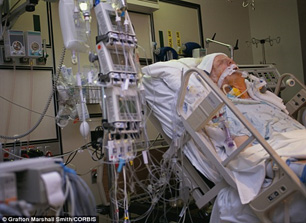Hi, it’s Patrik Hutzel from INTENSIVECAREHOTLINE.COM where we instantly improve the lives for Families of critically ill Patients in Intensive Care, so that you can make informed decisions, have PEACE OF MIND, real power, real control and so that you can influence decision making fast, even if you’re not a doctor or a nurse in Intensive Care!
This is another episode of “YOUR QUESTIONS ANSWERED” and in last week’s episode I answered another question from our readers and the question was
Will ECMO Give My Mom A Fighting Chance To Live In ICU?
You can check out last week’s question by clicking on the link here.
In this week’s episode of “YOUR QUESTIONS ANSWERED” I want to answer questions from one of my clients Ella, as part of my 1:1 consulting and advocacy service! Ella’s dad is admitted to ICU due to a stroke and is on a ventilator now. Ella is asking why the ICU team is pushing his dad out of the ICU so early.
Why is the ICU Team Pushing My Critically Ill Dad Out of the ICU Too Soon?

Ella: Hello?
Patrik: Hi, Ella! How are you?
Ella: I’m good. How are you, Patrik?
Patrik: Very good, thank you. Can you hear me okay?
Ella: Yeah, I can hear you.
Patrik: That’s good. Ella, how can I help you? I got your email. Got your voice message. Is there-
Ella: This will be a short call. Right? So-
Patrik: Fairly short call. Yes.
Ella: Yeah. You got my father’s situation. Right?
Patrik: Yes. From your email. Yes.
RECOMMENDED:
Ella: And basically they’re started talking about palliative care and all those things. So-
Patrik: Yup. Let me ask you this. Your father is with you in your location, right?
Ella: Yes he’s admitted here.
Patrik: Yes.
Ella: He was visiting me and then actually, this thing happened. He was hospitalized … This is the fourth time. And this time he came in for a shortness of breath for COVID. And then a week ago, around Thursday, he developed this brain bleeding or hemorrhage. And then they took him for CT scan and everything, and then that is when they put … The next morning, they put him on a ventilator support. He is now on the fifth day on ventilator support.
Patrik: Fifth day.
Ella: They took his SBT test today. He was doing for about two hours and then they stopped it, it seems. So-
Patrik: What test?
Ella: Spontaneous Breathing Test.
Patrik: Oh yeah. Okay. Yeah.
Ella: He did it yesterday or two days back and he couldn’t withstand for a long. Today he did it for about two hours. And then they’re going to continue. But I want him to be a case, like COVID free, and then respiratory wise he should be normal and everything. Right? At least to offer ventilator support before they can bring out of the hospital or discharge or anything. Talk about that. Right? So it’s still a little bit far from that, so I just wanted to discuss on those things. So…
Recommended:
Patrik: Yep. So more or less he had a stroke. Is that right?
Ella: Yeah. A hemorrhagic stroke, I believe, because of the hypertension. He was on Lovenox and then he was on aspirin. He was not on Lovenox on a regular basis, but in the hospital they were giving, just to be preventing. But because of his fluctuating high-blood pressure, and then that might’ve caused this, the hemorrhage, I believe. I don’t know, because I immediately asked them. They also did some counter measures to give coagulant thing, like an anti-thing kind of thing.
Patrik: Yeah, to stop it.
Ella: Yeah, so it took one day or two, more than one day to … Because they had it on Thursday morning, and then the scans. And then Friday morning is they said it turned worse and then they put him on a ventilator support.
Patrik: Right. Okay.
Ella: And then things that we know, for the last three days they didn’t take any further scanning or anything like that, but they just said everything is steady in terms of the bleed and everything. Hemodynamic stability is also good, at least for now. So that’s where the situation is.
Patrik: Yeah. Okay. Couple of things there. So five days on a ventilator, isn’t it?
Ella: Correct.
Patrik: Yeah. Okay. Look, the first thing that stands out to me here, Ella is, five days on a ventilator is not a long time. So moving someone to hospice after five days, from my experience, is inappropriate. Right? If you came to me five weeks, I would say, “Okay, all right. What’s happened in those five weeks?” Five days is not a long time. I guess-
Ella: Actually, there is a fine-line difference between the palliative care and hospice care. I don’t know about other countries on that. I just spoke with them. And then I told that … Today, in fact, a couple of hours back, I spoke to them and then I said, let him be COVID-free first and move it to the regular ICU before they can talk about at least other steps or anything like that. So you see, they’re saying that respiration-wise he’s okay. His lung x-rays and all seems to be the same. So he has to be at least a COVID-free so they can be treating him like a normal ICU. Right?
Patrik: Well, the COVID certainly throws everything out of plan at the moment. Most ICUs at the moment, from what I understand, are pretty full with COVID. But, I guess, it sounds to me like your father’s … He’s on a ventilator, but he’s not in lung failure from what you’ve-
Ella: No.
Patrik: Right. So most patients in ICU at the moment with COVID are in lung failure. So the primary reason your dad is in ICU is not the COVID, it’s the stroke.
Ella: Yeah. Right.
Recommended:
Patrik: Right? So, okay. So let me explain this to you, steps forward. Hospice, from my experience is inappropriate at this time, right? Because five days … As I said to you, five days in ICU, it’s not a long time again. If you came to me, “Oh, it’s been five weeks. He’s still on a ventilator. He’s not waking up.” Okay. Well let’s reassess situation-
Ella: Yeah. In fact, I had a video call with him when he was in his room. He was lifting his hand and making movements with his right hand.
Patrik: Oh, good!
Ella: So, he’s responding to pain stimuli, when other people are moving him around, or something like that. So he is opening his eyes. That’s what the nurse told me. And then his SBT test, breathing test also, seemed to be better from what I heard. He could withstand a little longer from the last thing. But I don’t want to get rushed also, in terms of the next steps. I read about your website and the agenda and all those things. I don’t want to get into any sort of those things, but all I am concerned is about his care and everything.
Patrik: Absolutely. Look, you also have to ask, why are they in a hurry to move him to hospice? There’s no rush to let people die. It always worries me if someone’s trying to push this.
Ella: But they’re saying about the palliative care. I mean not hospice. And then I told him that they started this. And then I returned back with the question that whether he’s COVID-free, why can’t you move them to a non- COVID ICU? Then she said, “It’s a very good point. I will ask back with the doctors.” That’s what she said. I’m not continuing any further on that conversation. I just want him to … He says that he’s going to continue like this. He’s not going to recover mobility wise and everything. I said, “Yeah. It will be there because of the severity of the stroke.” And then it might take weeks or even months. I don’t know when he’s going to be at least even 20 or 40% of the previous thing.
Recommended:
Patrik: Sure. It’s very hard to predict the future. I would recommend for anyone to say, it’s going to be very difficult to withhold the future. There is something in your email that I just need to double check. Is he still on sedation?
Ella: No.
Patrik: Good.
Ella: He’s out of sedation. For the last three days, he’s out of sedation.
Patrik: Okay. Have you heard of the term Glasgow Coma Scale? Have you heard of that?
Ella: Yeah, I read that. I think he is … What do you call this? Not totally unconscious, but he is maybe three or something like that. A three, a four.
Patrik: Three is the lowest. The Glasgow Coma Scale goes from three to 15. So you and I, talking, we are both a Glasgow Coma Scale 15. A GCS of three is basically someone unconscious, eyes closed, not responding to anything. But if you’re telling me he’s moving his right arm, he can’t be at GCS three.
Ella: Okay.
Patrik: It would be higher.
Ella: Maybe five, maybe eight. I don’t know.
Patrik: Five, eight. Five to eight, it maybe even up to 10.
Ella: Yeah. They were saying … Sorry to interrupt you. They were saying they’re constantly assessing him on a day-to-day basis.
Patrik: Of course. Okay. Moving forward. Five days on a ventilator, that’s not a long time. The question with the tracheostomy is really, if he can’t come off the ventilator 10 to 14 days, then a tracheostomy might be the right thing to do. If you feel they’re pushing you towards palliative care or hospice, I wouldn’t get pushed, because that might be the end of the life for your father. Right? Are you the medical power of attorney for your dad?
Recommended:
Ella: Yes, I am the only one. Actually, my brother passed away, unfortunately last 2 years, in 2018. So he was here and then he’s there. He was hypertensive. He was not having that much of a mobility also. And this one has crippled him like a little bit beyond, more than what it was there before.
Patrik: Sure.
Ella: Initially they were saying his quality of life would be poor and all those things. And then they’re trying to have a straight talk with me and all those things. And then I said, “Do whatever you want in terms of him to come out of this critical situation first, the debilitating situation first, and then we can talk about other things-
Patrik: Well, and then you can talk about quality of life. Absolutely. I’m sorry, I need to change the room, because there’s a lot of noise out there. Just give me one second, please. I’ll be right back with you. I just need to go into a different room, because of the noise. Okay. Sorry, just give me one second, please. I’ll be right back with you.
Ella: Okay.
Patrik: Okay. I’m back now. Yes, I wouldn’t worry too much about what they’re saying with quality of life. Just simply, no-one can predict that. Also, quality of life is something that you and your family need to decide what’s acceptable for you. It’s not something you should feel obliged to by the doctors. They have a different point of view than you have. It doesn’t matter, right, what they think, really. It depends on your beliefs. It depends on what your dad would want in a situation like that. Do you know what he would want?
Recommended:
Ella: Actually, the goal is to take him back to his hometown. He wanted to go home, but at least he should be fit enough or something to take back the journey. Right? So that’s what I told them, because they’re told something negative, this palliative care people. They said, “You can cremate here and take the ashes there,” or something like that. Those kinds of things.
Patrik: It’s just inappropriate. It’s very inappropriate. It’s not for them to talk about what you want and what he wants.
Ella: Yeah. That’s what even my husband was also telling. Like, “What is that they told you? They do, like, upset or something?” I said, “They’re trying to force some point or something to me.” I said that’s why I returned the question to them that let him be COVID-free, because they’re saying they’ll take 14 days, sometimes 20 days also, to certify somebody’s COVID-free. He got admitted weeks ago. So I think it has taken like 14 days now. So I don’t know when they are going to do the COVID test, so that at least one thing can be checked off, all right. So at least he can be COVID-free and he can be on a non-COVID unit, at least.
Patrik: Yeah. Of course.
Ella: Because I cannot go and visit him now. Only I-
RECOMMENDED:
Patrik: Yeah. Can you see him? Do they give you Face Time?
Ella: Yeah, that they do. Today, the first day actually I had that. That is why I was telling he was lifting his arm and doing like this-
Patrik: Yeah, sure. Going forward, Ella, I believe I can help you. The one way I can help you with, is certainly giving you a second opinion, talking to the doctors with you. I do believe that would be very helpful, because I argue that they always tell families only half of the story. Right? So, they’re telling you, he should go to palliative care. He should go to hospice. If you and I were on a call with the doctors, I would ask them a series of clinical questions. And I would ask them, “Well, have you done this? Have you done that? So, at the moment, you are in a position where you can’t ask all the questions. I’ve worked in the environment for 20 years. I can just rattle off some questions and they know, okay, they have to tell you the full story. They have to be transparent. I would like to know what ventilator settings is he on? That’s just one example.
The 1:1 consulting session will continue in next week’s episode.
How can you become the best advocate for your critically ill loved one, make informed decisions, get peace of mind, control, power and influence quickly, whilst your loved one is critically ill in Intensive Care?
You get to that all important feeling of making informed decisions, get PEACE OF MIND, CONTROL, POWER AND INFLUENCE when you download your FREE “INSTANT IMPACT” report NOW by entering your email below!
In Your FREE “INSTANT IMPACT” report you’ll learn quickly how to make informed decisions, get PEACE OF MIND, real power and real control and how you can influence decision making fast, whilst your loved one is critically ill in Intensive Care! Your FREE “INSTANT IMPACT” Report gives you in-depth insight that you must know whilst your loved one is critically ill or is even dying in Intensive Care!
Sign up and download your FREE “INSTANT IMPACT” REPORT now by entering your email below! In your FREE “INSTANT IMPACT” REPORT you’ll learn how to speak the “secret” Intensive Care language so that the doctors and the nurses know straight away that you are an insider and that you know and understand what’s really happening in Intensive Care! In your FREE report you’ll also discover
- How to ask the doctors and the nurses the right questions
- Discover the many competing interests in Intensive Care and how your critically ill loved one’s treatment may depend on those competing interests
- How to Eliminate fear, frustration, stress, struggle and vulnerability even if your loved one is dying
- 5 mind blowing tips & strategies helping you to get on the right path to making informed decisions, get PEACE OF MIND, control, power and influence in your situation
- You’ll get real world examples that you can easily adapt to you and your critically ill loved one’s situation
- How to stop being intimidated by the Intensive Care team and how you will be seen as equals
- You’ll get crucial ‘behind the scenes’ insight so that you know and understand what is really happening in Intensive Care
- How you need to manage doctors and nurses in Intensive Care (it’s not what you think)
Thank you for tuning into this week’s YOUR QUESTIONS ANSWERED episode and I’ll see you again in another update next week!
Make sure you also check out our “blog” section for more tips and strategies or send me an email to [email protected] with your questions!
Also, have a look at our membership site INTENSIVECARESUPPORT.ORG for families of critically ill Patients in Intensive Care here.
Or you can call us! Find phone numbers on our contact tab.
Also check out our Ebook section where you get more Ebooks, Videos and Audio recordings and where you can also get 1:1 counselling/consulting with me via Skype, over the phone or via email by clicking on the products tab!
This is Patrik Hutzel from INTENSIVECAREHOTLINE.COM and I’ll see you again next week with another update!







